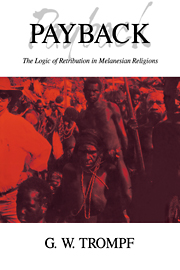Book contents
- Front Matter
- Contents
- Illustrations and tables
- Preface
- Abbreviations
- Preliminaries: The Theory of Retributive Logic
- Part One 'TRADITION'
- Part Two 'CARGO CULTISM'
- Part Three 'MODERNIZATION'
- Chapter 7 Recrimination—in ‘Modern’ Guises
- Chapter 8 Making Money and Modernizing Reciprocities
- Chapter 9 Money, Morals, Meaning: Old Logics, New Retributions?
- Conclusions and Recommendations
- Bibliography
- Index of Melanesian Cultures
- General Index
Chapter 9 - Money, Morals, Meaning: Old Logics, New Retributions?
Published online by Cambridge University Press: 22 September 2009
- Front Matter
- Contents
- Illustrations and tables
- Preface
- Abbreviations
- Preliminaries: The Theory of Retributive Logic
- Part One 'TRADITION'
- Part Two 'CARGO CULTISM'
- Part Three 'MODERNIZATION'
- Chapter 7 Recrimination—in ‘Modern’ Guises
- Chapter 8 Making Money and Modernizing Reciprocities
- Chapter 9 Money, Morals, Meaning: Old Logics, New Retributions?
- Conclusions and Recommendations
- Bibliography
- Index of Melanesian Cultures
- General Index
Summary
In this, the last formal chapter, we test money as an index to modernity and to changing interrelationships between negative and positive reciprocities, before completing our analyses of the logic of retribution as explanation.
Money as a payback medium: with special reference to Papua New Guinea
Considered as neutral specie, quite ‘clean of itself’ money is the ‘most abstract and “impersonal” element that exists in human life’ (thus Weber 1946: 331, cf. Marx [1857–58] 1973: 225). As abstraction, though, money is capable of being divinized and mythologized, on the one hand, and held up as the supreme symbol of secularity and this-worldly success, on the other. In Melanesia, on the one side, traditional currencies were never unendowed with some sacred character of association, and usage of them encompassed much more than ‘plain’ economics. When the new medium of exchange was infused into subsistence economics, it was bound to carry with it sacred qualities, partly transferred from old notions about currencies and partly arising from the whole miraculous overtone of the ‘white phenomenon’ (cf., e.g., Schwimmer 1973: 105–07).
- Type
- Chapter
- Information
- PaybackThe Logic of Retribution in Melanesian Religions, pp. 410 - 456Publisher: Cambridge University PressPrint publication year: 1994



